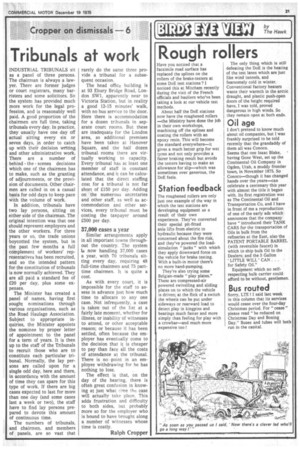Rough rollers
Page 23

If you've noticed an error in this article please click here to report it so we can fix it.
Have you noticed that a facsimile road surface has replaced the splines on the rollers of the brake-testers at some DoE test stations ? I noticed this at Mitcham recently during the visit of the French officials and hauliers who've been taking a look at our vehicle test methods.
About half the DoE stations now have 'the roughened rollers —the Ministry have done the job in their own workshops, machining off the splines and coating the rollers with an epoxy resin. This will become the standard everywhere—it gives a much better grip for wet tyres and not only provides a fairer braking result but avoids the testers having to make an allowance for slip—which was sometimes over generous, the DoE feels.
Station feedback
The roughened rollers are only just one example of the way in which the test stations are developing equipment as a result of their own experience. They've converted their special pit-fitted axle lifts from electric to hydraulic because they were concerned about the fire risk, and they've powered the loadsimulation " jacks " with which they apply downward force on the vehicle for brake testing. With a built-in motor there's no more hand-pumping.
They're also trying some Belgian-made "play plates." These are compressed-air powered swivelling and sliding plates on to which the vehicle is driven; at the flick of a switch the wheels can be put under sideways or rearward load to detect play in kingpins and bearings much faster and more simply than feeling for play with a crowbar—and much more expensive too ! The only thing which is still defeating the DoE is the heating of the test lanes which are just like wind tunnels, and fearsomely cold in winter. Conventional factory heaters waste their warmth in the arctic draught, and plastic push-c■pen doors of the height required have, I was told, proved dangerous in high winds, So they remain open at both ends.
Oil age
I don't pretend to know much about oil companies, but I was frankly surprised to be told recently that the grandaddy of them all was Conoco.
Seems that one Isaac Blake, having Gone West, set up the Continental Oil Company in Ogden, Utah, a muddy frontier town, in November 1875. So Conoco—though it has changed hands over the years—can celebrate a centenary this year with almost the title it began with. Its first registration was as The Continental Oil and Transportation Co, and I have in front of me a reproduction of one of the early ads which announces that the company have "introduced their TANK CARS for the transportation of Oils in bulk from the refineries at the East, also the PATENT PORTABLE BARREL (with reversible faucet) in which to ship bulk Oil to the Dealers; and the 5 Gallon ' LITTLE WILL' CAN . for Safety Oil."
Equipment which no selfrespecting bulk carrier could afford to be without, gentlemen.
Bus routed
Sorry, LTE! I said last week in this column that its services would cease over the four-day Christmas period. For " cease" please read " be reduced on Christmas Day and Boxing Day." Buses and tubes will both run in the capital.












































































